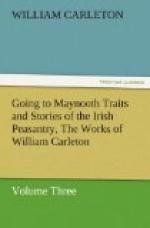“Thus we go on absolving in great style, till it is time for the matutinal meal—vulgarly called breakfast; when the whiskey, eggs, toast, and tea as strong as Hercules, with ham, fowl, beef-steaks, or mutton-chops, all pour in upon us in the full tide of hospitality. Helter-skelter, cut and thrust, right and left, we work away, till the appetite reposes itself upon the cushion of repletion: and off we go once more, full an’ warm, to the delicate employment of adjudicating upon sin and transgression, until dinner comes, when, having despatched as many as possible—for the quicker we get through them the better—we set about despatching what is always worth a ship-load of such riff-raff—videlicet, a good and extensive dinner. Oh, ye pagan gods of eating and drinking, Bacchus and—let me see who the presiding deity of good feeding was in the Olympian synod—as I’m an unworthy candidate I forget that topic of learning; but no matter, non constat. Oh, ye pagan professors of ating and drinking, Bacchus, and Epicurus, and St. Heliogabalus, Anthony of Padua, and Paul the Hermit, who poached for his own venison, St. Tuck, and St. Takem, St. Drinkem, and St. Eatem, with all the other reverend worthies, who bore the blushing honors of the table thick upon your noses, come and inspire your unworthy candidate, while he essays to chant the praises of a Station dinner!
“Then, then, does the priest appropriate to himself his due share of enjoyment Then does he, like Elias, throw his garment of inspiration upon his coadjutors. Then is the goose cut up, and the farmer’s distilled Latin is found to be purer and more edifying than the distillation of Maynooth.
’Drink deep, or
taste not that Pierian spring,
A little learning here’s
a dangerous thing.’
And so it is, as far as this inspiring language is concerned. A station dinner is the very pinnacle of a priest’s happiness. There is the fun and frolic; then does the lemon-juice of mirth and humor come out of their reverences, like secret writing, as soon as they get properly warm. The song and the joke, the laugh and the leer, the shaking of hands, the making of matches, and the projection of weddings,—och, I must conclude, or my brisk fancy will dissolve in the deluding vision! Here’s to my celebrity to-morrow, and may the Bishop catch a Tartar in your son, my excellent and logical father!—as I tell you among ourselves he will do. Mark me, I say it, but it’s inter nos, it won’t go further; but should he trouble me with profundity, may be I’ll make a ludibrium of him.”
“But you forget the weddings and christenings, Denis; you’ll have great sport at them too.”
“I can’t remember three things at a time, Brian; but you are mistaken, however, I had them snug in one corner of my cranium. The weddings and the christenings! do you think I’ll have nothing to do in them, you! stultus you?”




